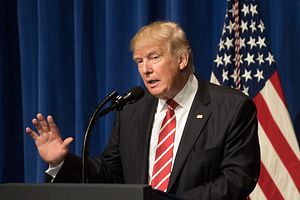Well, Donald Trump may have just managed to whip up a perfect storm, rocking the U.S.-South Korea alliance with less than two weeks to go before South Korea’s presidential elections. In an interview released Thursday evening (Friday morning in Asia) by Reuters, Trump suggested that he may look to “terminate” the U.S.-South Korea Free Trade Agreement (KORUS), which he described as a “horrible deal.” He went on to add that he want South Korea to pay an estimated $1 billion for the Terminal High Altitude Area Defense (THAAD) system, which is days away from deployment. (Remember: He’s also repeatedly criticized South Korea for inadequate host nation support payments for the permanent U.S. military presence there.)
Keep in mind that all this comes after the South Korean media excoriated the U.S. president for misleading signaling regarding the position of a U.S. carrier strike group earlier in the month. On top of that, Trump had told the Wall Street Journal in an interview shortly after his meeting with Chinese President Xi Jinping at Mar-a-Lago in Florida that “Korea actually used to be a part of China,” further incensing public opinion in South Korea.
It should go without saying that pretty much all of the above is disastrous for reassuring a critical U.S. ally in Northeast Asia — particularly as tensions run hot with North Korea amid mixed signaling from the United States. Consider that in the same Reuters interview, Trump decided it was a good idea to say there was a “chance we could end up having a major, major conflict with North Korea.” It remains unclear if he’s even aware that South Korea is on the cusp of a presidential election after a bout of political crisis.
A foreign policy adviser to Moon Jae-in, the presidential front runner from the center-left Minjoo Party, said that the idea of South Korea paying for THAAD was “impossible.” (The U.S.-South Korea alliance, of course, long ago decided that Washington would bear the costs for the deployment and operation of the battery.) No doubt U.S. diplomats at the Department of State — most of whom are acting career foreign service officials given the dearth of appointments — will be working overtime to steady this ship.
The Reuters interview is the latest example of a critical flaw that bedevils Trump in seemingly every major interview: he simply does not possess the capacity to let a question go by with a simple “No comment,” or “We’re still working on that.” Every question must have an answer and, if possible, it must have a bombastic answer, be it a $1 billion ask for THAAD or a “major, major” conflict with North Korea around the corner.
Separately, U.S. Secretary of State Rex Tillerson, diverging sharply with Trump, said Thursday evening that the United States would be willing to talk to North Korea, thereby further muddling the administration’s messaging. Almost simultaneously, we had reports of the president suggesting that conflict was likely and the secretary of state saying that the path ahead would be talks after certain preconditions are met (a variant of the old policy that held for much of Barack Obama’s time in office). Whatever this administration’s North Korea policy is, it is not being communicated clearly to either the American public, to U.S. allies in the region, or even to North Korea. The whiplashing between engagement and empty coercive threats moreover will serve to deepen suspicions in Pyongyang that this administration prone to brash action, potentially increasing North Korea’s incentives to up its own coercive actions.
The above list of messaging snafus and contradictions is perhaps unsurprising given Trump’s volatile rhetorical ticks, Tillerson’s inexperience, a lack of whole-of-government coordination, and an absence of Asia-focused appointees. In an ideal world, the two-month policy review on North Korea that the administration embarked on in early February would have ironed out the kinks and resulted in a somewhat coherent idea of how the administration would approach North Korea. It still seems as if that hasn’t happened.
As a closing thought, one wonders what the effect of all this might be longer term in South Korea, where domestic political winds are already blowing toward greater independence from the United States, based on the rhetoric from certain presidential candidates. Hong Joon-pyo, a conservative candidate from disgraced former President Park Geun-hye’s party, said, for example, that given Trump’s misleading remarks about the USS Carl Vinson carrier strike group, “South Korea will not trust whatever Trump says.” Trump’s antics will create ample fodder for South Korean politicians gunning for an indigenous nuclear capability as well.
As long as Trump continues to interview as he does, dropping off-the-cuff cost estimates for already-settled deals and foreshadowing sudden conflict, none of this will get better. More seriously, the administration needs to figure out and stick to a message on its North Korea policy (or stop talking about North Korea policy until its ready to settle on a direction). If things keep heading down this path, the trust and goodwill that underpins the U.S.-South Korea alliance will enter a period of serious jeopardy. Even if alliances are far more likely to bend rather than break, especially in the short term, the stakes are far too high on the Korean Peninsula today for this confused, id-based foreign policy to persist.

































